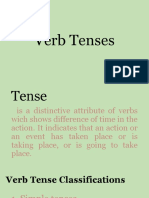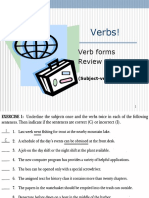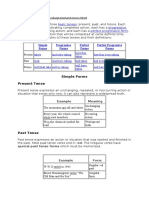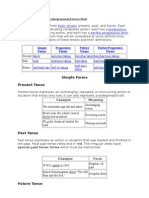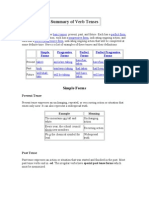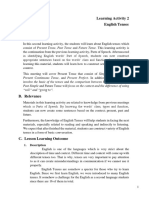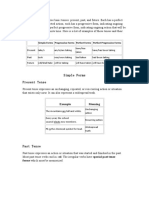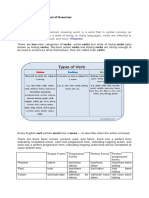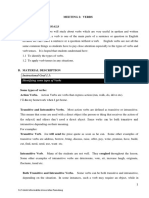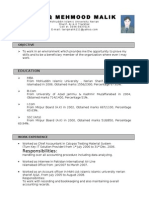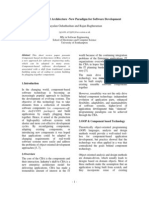7 - Tenses of Verbs
7 - Tenses of Verbs
Uploaded by
Jyrill Dyne P LannaonCopyright:
Available Formats
7 - Tenses of Verbs
7 - Tenses of Verbs
Uploaded by
Jyrill Dyne P LannaonCopyright
Available Formats
Share this document
Did you find this document useful?
Is this content inappropriate?
Copyright:
Available Formats
7 - Tenses of Verbs
7 - Tenses of Verbs
Uploaded by
Jyrill Dyne P LannaonCopyright:
Available Formats
Grammar and Composition 1
TENSES OF VERBS
TENSE DEFINED
A form of the verb that shows the time of an action or a condition
The grammatical marking on verbs that usually indicates time reference relative to the time of
speaking or the time at which some other situation was in force (Jacobs, 1995)
ASPECT DEFINED
A form of the verb used to signify ways in which an event is viewed or experienced
Can be (1) completed whole – simple, (2) whether or not it has occurred earlier – perfect, or (3) still
in progress – progressive
WHY IS THE TENSE OF A VERB IMPORTANT?
The tense of a verb tells you if something is happening now, was happening at some
time in the past, or will be happening at some time in the future.
TENSES OF VERBS
1. SIMPLE PRESENT TENSE
WHEN TO USE?
A. Used for a statement that shows present action or condition
EXAMPLE:
Metro Manila is dirty and overpopulated.
B. Used for a statement held to be generally true at the moment of speaking, i.e. present fact
EXAMPLE:
The Philippines is the most industrialized country in Southeast Asia.
He lives in Tuguegarao City, Cagayan.
C. Used for a statement that shows general truth or permanent condition
EXAMPLE:
The Earth and other planets revolve around the sun.
D. Used for a statement of a habit or usual activity, i.e. habitual action or condition
EXAMPLE:
Bicolanos cook many dishes with coconut milk and chili.
E. Used for a statement about what a document states or what a film or video shows
EXAMPLE:
The 1987 Constitution provides for the creation of three constitutional commissions.
VERB FORMS EXAMPLES TIME EXPRESSIONS
base form clean, write every- (everyday) today
-s form cooks, drinks this- (this month) -ly (daily)
always often
2. SIMPLE PAST TENSE
WHEN TO USE?
A. Used for a statement that shows completed action or condition at a definite time in the past.
Definite time means the time I know and you know. It is specific or exact.
EXAMPLE:
Father was terribly depressed yesterday.
B. Used for a statement which was true in the past but no longer true at the moment of speaking
EXAMPLE:
The Philippines was the best English-speaking country in Asia.
VERB FORM EXAMPLES TIME EXPRESSIONS
past form watered, bought during + past event yester- (yesterday)
last- (last year) -ago (two weeks ago)
the other- (the other night) before/after- (before lunch)
Prepared by ARVEE P. BUCARILE 1|5
Grammar and Composition 1
3. SIMPLE FUTURE TENSE
WHEN TO USE?
A. Used for a statement that shows future action or condition, something likely to happen
EXAMPLE:
The room will be warm soon.
VERB FORM EXAMPLES TIME EXPRESSIONS
will/shall + base form will attend tomorrow in/on + future time
shall arrive soon next- (next month)
tonight after + future time
later during + future time
afterwards
LET’S DO IT!
Give the correct form of the verbs in parentheses. Consider the time of the action or condition.
1. Filipinos (enjoy) ___________________ playing basketball.
2. The Philippines (be) ___________________ one of the poorest countries in the world in 2010.
3. I (attend) ___________________ to your concern tomorrow, so please be patient.
4. Mother (go) ___________________ to Saudi Arabia last year.
5. The police officers (undergo) ___________________ health examination annually.
6. The graduates (weep) ___________________ after listening to my speech.
7. Grandma (tell) ___________________ stories every night.
8. The family often (seek) ___________________ adventure in unheard of tourist spots.
9. Kenny (choose) ___________________ to go with Ritchie last month.
10. I (run) ___________________ three kilometers straight the other night, because a dog (come)
___________________ after me.
4. PRESENT PERFECT TENSE
WHEN TO USE?
A. Used to show a recently completed action. This is usually used with the adverbs just and already.
EXAMPLE:
The Philippines has just eased the rising prices of rice.
B. Used for a statement which was true in the past and is still relevant to the present
EXAMPLE:
Members of political dynasties have figured prominently in politics.
C. Used to show an action that happened at an indefinite time
EXAMPLE:
Manuela has already finished her project in Natural Science.
D. Used for a statement about an extraordinary achievement done for the first time
EXAMPLE:
Man has landed on the moon.
VERB FORM EXAMPLES TIME EXPRESSIONS
has/have + past participle has gone just already
have written yet (not yet completed) lately
ever (question) recently
never
5. PAST PERFECT TENSE
WHEN TO USE?
A. Used for an action which was completed before another past action or past time reference. It
expresses the earlier of two past actions.
EXAMPLES:
The class had dismissed before the bell rang.
The train had left when we reached the station.
I had slept by the time they arrived.
The mail arrived after you had gone to work.
NOTE: The past perfect tense is used with the past tense. The earlier of two past actions is in past prefect
tense, while the later action is in past tense.
Prepared by ARVEE P. BUCARILE 2|5
Grammar and Composition 1
VERB FORM EXAMPLES TIME EXPRESSIONS
had + past participle had finished before by the time
had brought when after
6. FUTURE PERFECT TENSE
WHEN TO USE?
A. Used to express an action that will be completed before another future action or future time
reference
EXAMPLES:
Fortunato will have put up a business by 2020.
Before the next term begins, these textbooks will have run out of copies.
I shall have slept by the time father arrives.
NOTE: The future perfect tense is used with the present tense. One of the actions is in future perfect
tense, while the other is in present tense.
VERB FORM EXAMPLES TIME EXPRESSIONS
will/shall + have + past will have completed by before
participle shall have read by the time
LET’S DO IT!
Give the correct form of the verbs in parentheses. Consider the time of the action or condition.
1. Gretel (cook) ___________________ the main dish by the time Hansel arrives.
2. Mother (go) ___________________ to bed when father arrived from Zamboanga.
3. Roy (undergo) ___________________ blood transfusion lately.
4. The doctor (finish) ___________________ the operation already.
5. Lilina, the janitress, (sweep) ___________________ the school grounds before the students arrive.
6. The officers (swear) ___________________ their oath before the President arrived.
7. The students understood the topic after you (give) ___________________ additional examples.
8. My classmates (pass) ___________________ their final requirements yet.
9. The bees (sting) ___________________ me by the time I noticed their hive.
10. Kent (tour) ___________________ Europe and Africa by December.
7. PRESENT PROGRESSIVE TENSE
WHEN TO USE?
A. Used to express an action that is going on at the moment of speaking
EXAMPLE:
We are discussing progressive tenses now.
B. Used to indicate changes, trends, developments, and progress
EXAMPLE:
His performance in class is improving.
VERB FORM EXAMPLES TIME EXPRESSIONS
am/is/are + present am speaking now this time
participle is knitting these days at the moment
8. PAST PROGRESSIVE TENSE
WHEN TO USE?
A. Used to express an action that was going on when another past action occurred
EXAMPLE:
I was sleeping when my phone rang.
B. Used to express a continuing action that started and ended in the past
EXAMPLE:
She was singing all afternoon yesterday.
VERB FORM EXAMPLES TIME EXPRESSIONS
was/were + present was working when
participle were losing
Prepared by ARVEE P. BUCARILE 3|5
Grammar and Composition 1
9. FUTURE PROGRESSIVE TENSE
WHEN TO USE?
A. Used to express an action that will be going on at a time to come. (Action will surely happen
because arrangements have been made.)
EXAMPLE:
The team will be practicing during July and August.
VERB FORM EXAMPLES TIME EXPRESSIONS
will/shall + be + present will be watching tomorrow in/on + future time
participle shall be swimming soon next- (next month)
tonight after + future time
later during + future time
LET’S DO IT!
Applying the progressive tenses, give the correct form of the verbs in parentheses.
1. The superintendent (evaluate) ___________________ teachers after the semestral break.
2. Mother (be) ___________________ very meticulous these days.
3. Uncle Silas (planting) ___________________ all day last Thursday.
4. The clerk (snooze) ___________________ when his boss called for her.
5. They (deal) ___________________ with the problem by the time the boss arrives.
6. I (do) ___________________ my projects now.
7. Marcos and Lucas (stay) ___________________ with the Javiers these days.
8. When my girlfriend arrived, I (read) ___________________ A Christmas Carol.
9. They (visit) ___________________ their relatives in Ballesteros.
10. Grandmother (knit) ___________________ a sweater for me.
10. PRESENT PERFECT PROGRESSIVE TENSE
WHEN TO USE?
A. Used to express an action that started at some time in the past, continued, and is still happening
now
EXAMPLE:
Eirika has been sitting there for three hours.
Ephraim and Emmanuel have been practicing for the contest since July.
VERB FORM EXAMPLES TIME EXPRESSIONS
has/have + been + has been arguing since + past time
present participle have been teasing for + length of time
11. PAST PERFECT PROGRESSIVE TENSE
WHEN TO USE?
A. Used to express an action that had been going on before being interrupted by another action (to
emphasize the duration of a continuous activity in the past)
EXAMPLES:
The class had been discussing the trip to the museum when the principal arrived.
The crop had been thriving until the locusts attacked.
VERB FORM EXAMPLES TIME EXPRESSIONS
had + been + present had been massaging before/until by the time
participle had been scolding when after
12. FUTURE PERFECT PROGRESSIVE TENSE
WHEN TO USE?
A. Used to express a continuing future action completed before another (to emphasize the duration
of an event in the future)
EXAMPLES:
Glenn shall have been writing the company report by March 2019.
By the time of my first game, I will have been practicing for two months.
VERB FORM EXAMPLES TIME EXPRESSIONS
will/shall + have + been will have been driving by before
+ present participle shall have been digging by the time
Prepared by ARVEE P. BUCARILE 4|5
Grammar and Composition 1
LET’S DO IT!
Applying the perfect progressive tenses, give the correct form of the verbs in parentheses.
1. My friend (teach) ___________________ in a university in Metro Manila by 2016.
2. Our neighbor (complain) ___________________ about the water supply for three weeks now.
3. The secretary (prepare) ___________________ the communications before the signatories arrived.
4. By the time everybody noticed, the speaker (talk) ___________________ about their weaknesses.
5. Pedro, together with his sisters, (till) ___________________ the field since their father’s death.
6. I (drive) ___________________ all night when I reach Baguio City.
7. Rob (work) ___________________ on that poem for a month, and it’s still unfinished.
8. Alma (see) ___________________ ghosts and supernatural beings after she got sick.
9. Until I reminded him, he (set) ___________________ aside his tasks.
10. The guest (lecture) ___________________ when someone shouted.
REFERENCES:
Brookes, E. D., et. al. (2012). Voyages in English: Writing and Grammar. Chicago: Loyola Press.
Forlini, G., et. al. (2010). Prentice Hall Grammar and Composition. Singapore: Pearson Education South
Asia Pte Ltd.
Malicsi, J. (2010). The English Linguistic Project: English Manual. Mandaluyong City: Anvil Publishing,
Inc.
Ramos, C.M., & Sanchez, A.C. (2010). Developing Skills in Grammar and Composition 1. Mandaluyong
City: National Book Store.
Prepared by ARVEE P. BUCARILE 5|5
You might also like
- CJC Lesson9 Verb TensesDocument9 pagesCJC Lesson9 Verb TensesJohn Carl AparicioNo ratings yet
- Q2 Week 3 Perfect TensesDocument43 pagesQ2 Week 3 Perfect TensesCathy Mae Castillo RiveraNo ratings yet
- Verb TensesDocument35 pagesVerb TensesGlaiza VillaverNo ratings yet
- Q2 Week 3 (Perfect Tenses)Document53 pagesQ2 Week 3 (Perfect Tenses)Cathy Mae Castillo RiveraNo ratings yet
- Bahasa Inggris Kelompok IVDocument8 pagesBahasa Inggris Kelompok IVAndi dwi pajrianiNo ratings yet
- Verbs!: Verb Forms Review of TensesDocument33 pagesVerbs!: Verb Forms Review of TensesradityaNo ratings yet
- Activity Sheet Perfect Tenses QTR 1 WK 4Document3 pagesActivity Sheet Perfect Tenses QTR 1 WK 4Jandelle Reigne FerreraNo ratings yet
- Revised Deductive Lesson Plan Group 3Document5 pagesRevised Deductive Lesson Plan Group 3Queen RosieNo ratings yet
- Lesson 2 (Perfect Tenses of The Verb)Document21 pagesLesson 2 (Perfect Tenses of The Verb)Mae Marielle FababeirNo ratings yet
- ENGLISH HANDOUT Present Perfect and Past PerfectDocument2 pagesENGLISH HANDOUT Present Perfect and Past PerfectFarrell Alvaro Christian100% (1)
- Basic Tenses Perfect Form Progressive Form Perfect Progressive FormDocument29 pagesBasic Tenses Perfect Form Progressive Form Perfect Progressive FormRadheShyam SharmaNo ratings yet
- Basic Tenses Perfect Form Progressive Form Perfect Progressive FormDocument29 pagesBasic Tenses Perfect Form Progressive Form Perfect Progressive FormRadheShyam SharmaNo ratings yet
- Basic Tenses Perfect Form Progressive Form Perfect Progressive FormDocument29 pagesBasic Tenses Perfect Form Progressive Form Perfect Progressive FormRadheShyam SharmaNo ratings yet
- English TensesDocument29 pagesEnglish TensesRadheShyam SharmaNo ratings yet
- Q4 Eng6 as#2-PerfectProgressive FINALDocument8 pagesQ4 Eng6 as#2-PerfectProgressive FINALKATRINA PEGOLLONo ratings yet
- English TensesDocument30 pagesEnglish TensesMohamed Tayeb SELT100% (65)
- Present Perfect Tense 7 PDFDocument11 pagesPresent Perfect Tense 7 PDFاسامه محمدNo ratings yet
- PURCOMMDocument9 pagesPURCOMMbmiranda.stiNo ratings yet
- Tenses - Grade 9 2024-25Document57 pagesTenses - Grade 9 2024-25smart.guy.arnavNo ratings yet
- Intervention MaterialDocument6 pagesIntervention MaterialFrancis Alyana Bustante MagtibayNo ratings yet
- English 7 Q1 WK4Document33 pagesEnglish 7 Q1 WK4RamilNo ratings yet
- Final DemoDocument10 pagesFinal DemoEmKey GCNo ratings yet
- Sw9 Verb TensesDocument25 pagesSw9 Verb TensesInês castaNo ratings yet
- Verb Tenses and AspectDocument17 pagesVerb Tenses and AspectJosh BhonNo ratings yet
- 12 Verb TensesDocument38 pages12 Verb TensesAzim BarbhuiyaNo ratings yet
- 1723473069 m Ql GfDocument9 pages1723473069 m Ql GfsuryatejanagaNo ratings yet
- English5 W1 Q2 PPTDocument58 pagesEnglish5 W1 Q2 PPTArjay De GuzmanNo ratings yet
- Basic Tenses Perfect Form Progressive Form Perfect Progressive FormDocument4 pagesBasic Tenses Perfect Form Progressive Form Perfect Progressive FormsumitNo ratings yet
- SEMINAR Past Tenses in English LanguageDocument10 pagesSEMINAR Past Tenses in English LanguageSulejman BeširovićNo ratings yet
- CSC GrammarDocument5 pagesCSC Grammarsandra seguienteNo ratings yet
- TensesDocument105 pagesTensesSai AmruthaNo ratings yet
- Week 4 - English 7-Past and Perfect TensesDocument34 pagesWeek 4 - English 7-Past and Perfect TensesMerly Relano Demandante100% (2)
- Pointers To Review in English 7onlineDocument6 pagesPointers To Review in English 7onlinepaustrian2No ratings yet
- Summary of Verb TensesDocument4 pagesSummary of Verb TensesMayur RawoolNo ratings yet
- Verb Tenses: Presenter: Duc SimonDocument16 pagesVerb Tenses: Presenter: Duc SimonSiew KhuanNo ratings yet
- Simple Forms Progressive Forms Perfect Forms Perfect Progressive FormsDocument4 pagesSimple Forms Progressive Forms Perfect Forms Perfect Progressive Formshardy annawayNo ratings yet
- Meeting 5 English TensesDocument10 pagesMeeting 5 English TensesSalmia AnwarNo ratings yet
- Assignment GrammarDocument54 pagesAssignment GrammarRameshLoganathanNo ratings yet
- Simple Forms Present Tense: Simple Forms Progressive Forms Perfect Forms Perfect Progressive FormsDocument8 pagesSimple Forms Present Tense: Simple Forms Progressive Forms Perfect Forms Perfect Progressive FormsJp Karl Gonzales UliganNo ratings yet
- Kelompok 3 EnglishDocument21 pagesKelompok 3 EnglishIka putriNo ratings yet
- Past Perfect 4Document11 pagesPast Perfect 4Fannes DesignNo ratings yet
- Aspects of VerbsDocument77 pagesAspects of VerbsnonNo ratings yet
- KWL Chart: What I Know What I Want To Know What I LearnedDocument18 pagesKWL Chart: What I Know What I Want To Know What I LearnedKyle Nessie AlayacyacNo ratings yet
- Summary of Verb TensesDocument4 pagesSummary of Verb TensesTrinh100% (1)
- Continuous TenseDocument18 pagesContinuous TenseMuh Andy AfdalNo ratings yet
- MY FINAL DEMODocument10 pagesMY FINAL DEMOFelito Litoy MagalonaNo ratings yet
- English7 q1 Module 4Document15 pagesEnglish7 q1 Module 4John ClausNo ratings yet
- GrammarDocument6 pagesGrammarYug JainNo ratings yet
- Reviewoftenses 130418155435 Phpapp01 (1)Document23 pagesReviewoftenses 130418155435 Phpapp01 (1)ahmadjonovbekmurod06No ratings yet
- Summary of Verb TensesDocument4 pagesSummary of Verb TensesRamir Y. LiamusNo ratings yet
- E9 Verb - 1Document4 pagesE9 Verb - 129camziiNo ratings yet
- Sentence Correction For GmatDocument92 pagesSentence Correction For GmatSuraj BhaduNo ratings yet
- Activity - Sheet - in - English 5 - Week 1Document4 pagesActivity - Sheet - in - English 5 - Week 1Kennedy Fadriquelan100% (6)
- Tenses of Verb Pre-DemoDocument31 pagesTenses of Verb Pre-DemoMaridel DiamsayNo ratings yet
- Projek Bing 1Document14 pagesProjek Bing 1Hutari AdeningsihNo ratings yet
- g6 q4w2 English PPT (Melcs)Document92 pagesg6 q4w2 English PPT (Melcs)Rose FamilaranNo ratings yet
- May 4Document10 pagesMay 4rossana rondaNo ratings yet
- The ConclusionDocument7 pagesThe ConclusionFaisal FNo ratings yet
- Pertemuan 2 Verbs PDFDocument8 pagesPertemuan 2 Verbs PDFriko cmenoxNo ratings yet
- Writing with Clarity and Accuracy: The Grammar You Need, Level 3From EverandWriting with Clarity and Accuracy: The Grammar You Need, Level 3Rating: 5 out of 5 stars5/5 (1)
- What Is Your Nationality? Where Are You From?Document2 pagesWhat Is Your Nationality? Where Are You From?Sabrina SousaNo ratings yet
- Reference Letter To JudgeDocument6 pagesReference Letter To Judgeafllwnffe100% (1)
- English 10 - Unit 5 Technology and You - ReadingDocument4 pagesEnglish 10 - Unit 5 Technology and You - ReadingThao Vy Nguyen Vu0% (1)
- New Observation of An English Language Teaching Class and Providing A Learner (2305843009214032265)Document9 pagesNew Observation of An English Language Teaching Class and Providing A Learner (2305843009214032265)taurion angelNo ratings yet
- Lesson Slides For Integrating QuotationsDocument10 pagesLesson Slides For Integrating QuotationsDavid ShcherbatykhNo ratings yet
- Developing Notetaking Skills in A Second Language Insights From Classroom ResearchDocument194 pagesDeveloping Notetaking Skills in A Second Language Insights From Classroom Researchtran xuan haoNo ratings yet
- Collins Easy Learning Audio Polish BookletDocument48 pagesCollins Easy Learning Audio Polish Bookletsobel0722100% (1)
- B1 - B2. Revision Sheet: She Has VisitedDocument10 pagesB1 - B2. Revision Sheet: She Has VisitedbocuoiNo ratings yet
- Tariq Mehmood MalikDocument2 pagesTariq Mehmood MaliksaeedkianiNo ratings yet
- Group 1 Review On Structure of English 111Document84 pagesGroup 1 Review On Structure of English 111Junior AlzateNo ratings yet
- 2017 2019 Syllabus MandarinDocument31 pages2017 2019 Syllabus MandarinmariamdesktopNo ratings yet
- Ladino & Sephardic CultureDocument48 pagesLadino & Sephardic Culturechrystek007100% (1)
- Origin and Development of LettersDocument30 pagesOrigin and Development of LetterswonwoNo ratings yet
- 144 Grammar Vocabulary 2star Unit3Document1 page144 Grammar Vocabulary 2star Unit3Tomás Cruz100% (1)
- RIPH Notes 1 5 1Document26 pagesRIPH Notes 1 5 1christanbagacinaNo ratings yet
- Rubrics and Marking Schemes Ulab3162Document13 pagesRubrics and Marking Schemes Ulab3162Mono BasiranNo ratings yet
- 01 Always - Exercises in HindiDocument5 pages01 Always - Exercises in HindiAnil MahatoNo ratings yet
- Component Based ArchitectureDocument4 pagesComponent Based Architecturerajan567No ratings yet
- Anual Uni Future Simple: InglésDocument4 pagesAnual Uni Future Simple: InglésAbdías Caparachin CapchaNo ratings yet
- GitHub - Dhanukarajat - Car-Rental - Online Car Rental System Using MySQL and PHPDocument2 pagesGitHub - Dhanukarajat - Car-Rental - Online Car Rental System Using MySQL and PHPdesta tekluNo ratings yet
- BĄCZKOWSKADocument358 pagesBĄCZKOWSKAtijayNo ratings yet
- API Connect Module 1Document20 pagesAPI Connect Module 1'SudarshanRaiNo ratings yet
- Chapter 2: Articulatory, Auditory and Acoustic Phonetics. PhonologyDocument4 pagesChapter 2: Articulatory, Auditory and Acoustic Phonetics. PhonologycalluraNo ratings yet
- Analytic Scale B2Document1 pageAnalytic Scale B2Ana Luiza BernardesNo ratings yet
- Sylvia Pankhurst Delphos 1927 PDFDocument120 pagesSylvia Pankhurst Delphos 1927 PDFFrancisco MurciaNo ratings yet
- Pet Speaking Part 3Document6 pagesPet Speaking Part 3Fiorella Gonzales CapuñayNo ratings yet
- Class Diagram Cheat SheetDocument3 pagesClass Diagram Cheat SheetDaniel AlejandroNo ratings yet
- Friesen Dianne PHD 2022 PDFDocument401 pagesFriesen Dianne PHD 2022 PDFwaymac007No ratings yet
- ActivInspire ReadmeDocument20 pagesActivInspire ReadmeDjamel MatkNo ratings yet
- 2023 Ssce External TimetableDocument1 page2023 Ssce External Timetableyted65hy5edNo ratings yet


